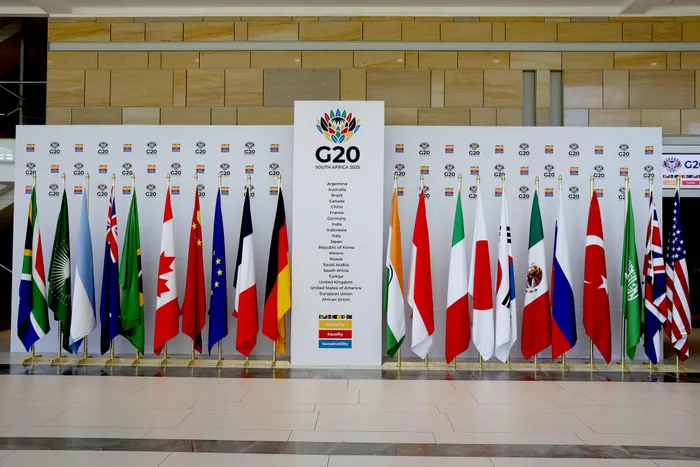The G20 in Africa: The diaspora, the continent’s secret weapon
Opinion

The Johannesburg global summit offers Africa's pivotal moment to rewrite its story, from a continent of perpetual potential to a global powerhouse poised for transformative growth.
Image: Supplied
In November 2025, Africa will host the G20 summit in Johannesburg for the first time. For many, it's a diplomatic milestone.
For me, it's a test: will we merely smile for the cameras alongside global powers, or will we seize this opportunity to reshape our continent's destiny? I often think back to two encounters.
In Manchester, a brilliant Nigerian doctor told me her parents still queue at a Lagos hospital where the X-ray machine has been out of service for a month. In Frankfurt, a Ghanaian engineer shared how he gave up on launching a startup in Accra, discouraged by power outages and bureaucratic red tape.
Both are now applying their talents to build other nations' futures, yet Africa is languishing behind; in squalor and degradation.
Here lies Africa's fundamental paradox: we possess both extraordinary human capital and phenomenal natural resources, yet we fail to harness either for our own development. Our continent brims with world-class talent that consistently migrates to fuel innovation abroad, creating what amounts to a permanent subsidy to developed economies.
Simultaneously, we hold 30% of the world's crucial mineral reserves, including cobalt, lithium, and manganese that power everything from AI systems to electric vehicles, yet we capture merely a fraction of their ultimate value.
This systematic undervaluation is compounded by the annual haemorrhage of $88 billion in illicit financial flows, exceeding all development aid received. We remain trapped in an economic model where our resources enrich global supply chains while our people struggle against systems that cannot retain either our wealth or our talent.
It is also important to emphasise that our true asset is not just beneath our soil. This includes both our continental population and our global diaspora, Africa's "sixth region". Millions of Africans, educated and thriving worldwide, lead labs, establish innovative companies, and advise global institutions. Why not harness their potential more effectively?
Imagine if, at the Johannesburg G20, the African Union unveiled a bold plan:
- Diaspora investment funds targeting agritech, healthcare, and the energy transition
- Tax and legal incentives to facilitate knowledge and capital transfers
- Widespread dual citizenship to streamline exchanges and mobility
- A structured mentorship program connecting diaspora scientists, engineers, and entrepreneurs with Africa’s young talent.
The question is not whether the African diaspora wants to contribute, but whether the 54 African Union member states will create the structures to harness their potential effectively.
These are neither fantasies nor unprecedented ambitions. India and China, despite similar colonial histories and developmental challenges, have successfully leveraged their diasporas to accelerate national growth.
Why can't African leaders do the same? We must move beyond ceremonial hospitality and discarded victimhood and gate-keeping of talent to become architects of our meritocratic future.
I left Senegal over thirty years ago on a scholarship. Since then, I have designed multi-billion-euro projects in Europe and advised the European Commission, helping build economies that now overshadow ours.
Yet whenever I see cobalt mined in the Congo powering California's Teslas while our cities face blackouts, or coal from South Africa fueling the Global North's electricity grid while the source nation suffers energy crises, I recognise our fundamental failure: we have traded our resources for pennies while losing our most brilliant minds to foreign lands.
The G20, therefore, represents not merely another diplomatic gathering, but an opportunity to rectify our own failures and historic injustices, to move beyond negotiation and toward the reclamation of our resources, our talent, and our narrative. Africa's greatest resource is her people.
The African diaspora constitutes not a sleeping giant but an awakened force awaiting structured engagement and unwritten opportunities. This global community represents a vast reservoir of capital, expertise, and influence that remains emotionally invested in Africa's rise.
Harnessing this potential requires creating institutional frameworks that incentivise return, investment, and collaboration. By establishing an enabling environment through policy reform, financial instruments, and diplomatic outreach, Africa can transform its diaspora from peripheral supporters into central engines of growth
This represents not charity but partnership, a mutual commitment to shared destiny.
To realise this vision, the African Union must leverage the G20 platform to propose concrete initiatives: a Continental Diaspora Investment Fund with sovereign guarantees to de-risk ventures in critical sectors; harmonised immigration policies granting visa-free travel and right-to-work access for diaspora members; and cultural-academic exchanges that rebuild broken bonds and inspire innovation.
This is how we transform nostalgia into nation-building.
The Johannesburg global summit offers Africa's pivotal moment to rewrite its story, from a continent of perpetual potential to a global powerhouse poised for transformative growth.
The diaspora represents our strategic advantage, our bridge to global markets, and our key to unlocking a future defined by prosperity, sovereignty, and self-determination.
As world leaders gather in Sandton, Johannesburg, let them recognise that Africa's time has come, not to be exploited but as an equal partner of change.
* Abdou Samb is a Senegalese engineer, mathematician, and European Commission advisor on digital transformation, committed to Pan-African solutions for meritocratic prosperity. He is also the President of Paris FRS Consulting.
** The views expressed here do not reflect those of the Sunday Independent, IOL, or Independent Media.